The Mind-Body-Food Connection
You are a whole being, not just the sum of parts
Every morning you wake up, stretch and climb out of bed to start a new day. For me, I wake up at 5 am every day. I find having a consistent wake up time is far more important to my health and wellbeing than when I go to bed (but I’ll save that for another story!). I put the kettle on, make some coffee, and settle into write for a few hours. These are the mornings I love.
Your mornings may look very different from mine. But what happens for all of us, each morning, is that we get up and start another day with our routines or our chaos, pretty much automatically. We don’t have think about opening our eyes, breathing, or sending energy to our muscles. All that happens on its own. We focus on our thoughts, our day ahead, how we feel, and who we will interact with.
How is all that possible?
Well, you know that you have your body and then you have your thoughts or mind. The fact that you are alive means that your basic survival needs are being met. You are breathing in oxygen and breathing out carbon dioxide. You are hydrated. And at some point in the previous day(s) you have had food. Most of this has happened with little effort on our part. You breathe automatically. You eat and drink when your body makes it clear you need to or when it makes you so uncomfortable that you have to.
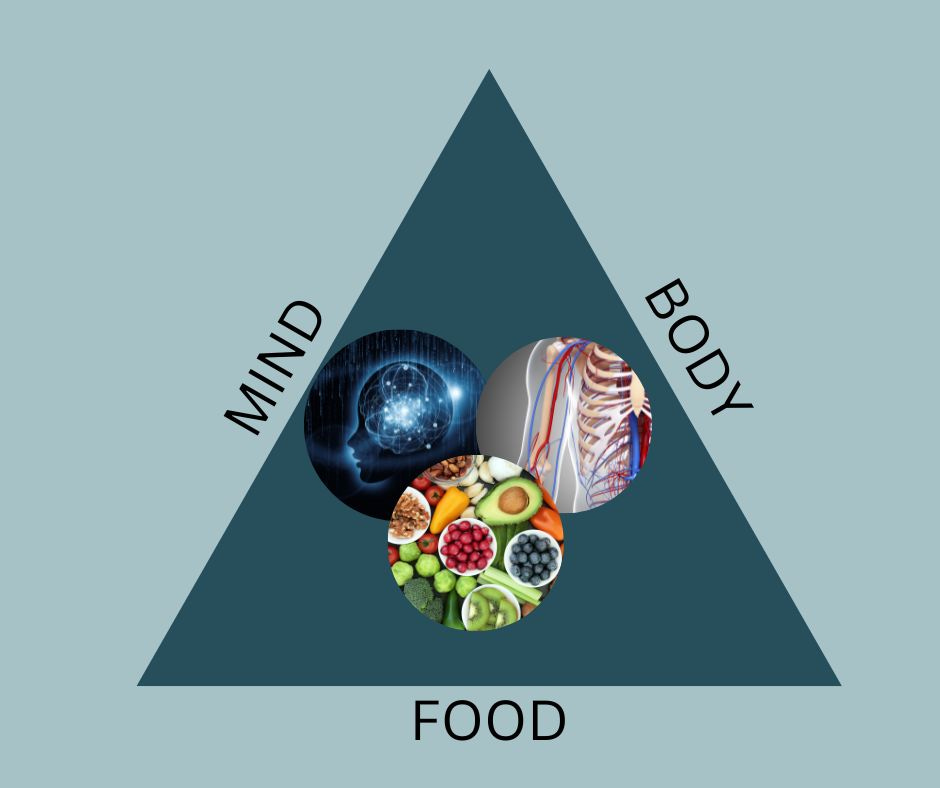
Even though you may think you are doing fine on this autopilot system, most of us fail to appreciate just how significant our Mind-Body-Food Connection actually is in shaping our physical and mental wellbeing.
Let’s take a closure look at the Mind, Body, Food relationships and begin to unravel some of the details that contribute to why you feel the way you do.
The Body-Food Connection
Let’s start with the most obvious connection between your body and food. You are already well aware as a human being that food and water are essential to your survival. You could only survive 3 to 7 days without water. If you had water, but no food, you might be able to survive 2 to 3 months depending on your starting condition.
Food is essential for your body to grow, maintain and heal itself. Food provides us with energy to move, react and think. We can only grow strong and have endurance with enough food in our system to sustain regular exercise. Deficiencies of key vitamins or minerals in our food cause significant diseases. Our longevity is affected by the quality of food we eat over our lifetimes and during significant periods of growth, healing, and stress.
A 2022 study published in PLOS Medicine modelled the impact of switching to a healthy diet on life expectancy. They showed that longevity gains could be achieved at any age with a sustained switch to a better diet, but that the largest gains in life expectancy came the earlier the diet shift occurred. The research team created an interactive online calculator (Food for healthy life) to let people discover the possible effects for themselves, although this study is looking at population changes in longevity, not individual predictions.
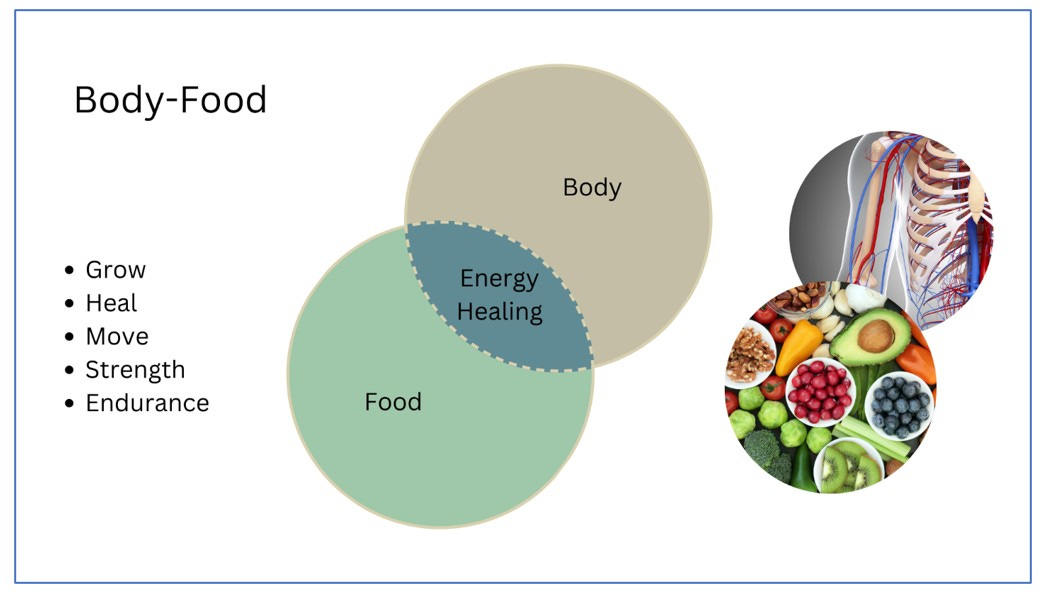
The Mind-Body Connection
Somewhat less obvious is the way our minds (i.e. our patterns of thinking) affect our bodies. Yes, we can consciously order our bodies to move in many ways. We can even take conscious control of our breathing, slowing it down to relief stress. However, there is a large part of our thinking that is much more hardwired than we might expect.
Our Mind-Body Connection is hardwired for survival. That isn’t likely top of your mind when you roll out of bed in the morning, but it is ultimately true. We are here today because for thousands of years our human ancestors survived seasonal and annual food shortages, ice ages, wildfires, droughts, floods, and periods of social discord, oppression, and war. They survived. Those survival instincts for self-preservation lie deep within us all.
From the time we are born, we are hardwired for survival. We learn from our parents, families, and through social norms, how to find food, water and shelter in the places we live. Without a moment of thought, we automatically launch into survival mode ( Fight-Flight-Freeze ) when we are threatened. This instinct helps us to respond quickly to danger.
That was great when the danger was a lion or tiger threatening to kill us. Or when our senses warned us not to linger on the water’s edge where crocodiles may be close by waiting just out of sight. It is not so great when this same survival instinct knocks us into overdrive because our boss just yelled at us, or our presentation is about to begin.
Our ancient Mind-Body Connection can’t tell the difference between you sitting at your desk worrying over how to pay the bills and the tiger about to eat you. When the danger cues feed into your mind or body, your response is largely automatic. To survive in the modern world, where stress does not mean instant death by lion, you need modern survival skills such as controlled breathing, meditation, mindfulness, exercise or other strategies to stop the snowball effects of your instincts when the dangers you face today are all in your head.
Beyond the well-known stress cycle, new research into the Mind-Body connection is revealing that some diseases may hold specific space within the brain’s neural network, and this might one day enable new forms of treatment. A ground-breaking study in 2021 demonstrated that the brains of mice retained the specific “memory” of having had an infection. When those specific brain cells were stimulated after the infection was long gone, the body immediately launched a full immune response at the site where the infection used to be. The study suggests that your brain has a neurological map of immune responses in your body. This information will contribute to the study of autoimmune disorders, arthritis and other inflammatory and immune responses. Why? Because when those brain areas were not stimulated, the response went away.
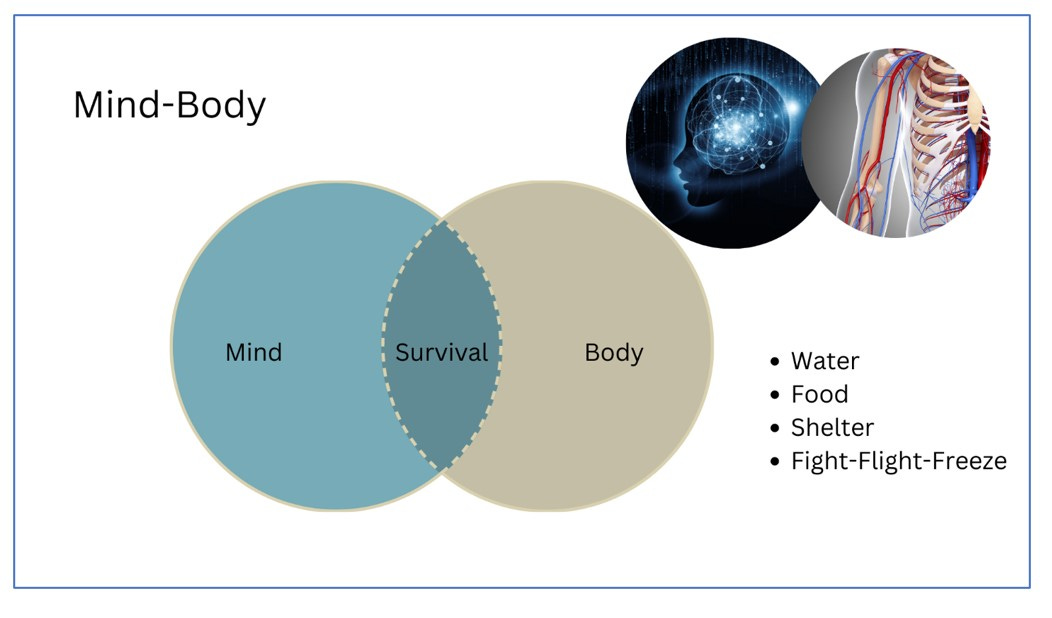
The Mind-Food Connection
Last, but in no way least, we can look at the Mind-Food Connection. More and more studies are demonstrating how the food you eat affects your ability to focus, stay awake or sleep, relax, and perform complex tasks. Many foods are mood-altering and behave like drugs in your system. Most of you know that a cup of coffee may make a person jittery if they are not used to the caffeine, while allowing a seasoned coffee drinker to focus better and be more productive.
A healthy diet provides your mind with the fuel it needs to perform. Something as simple as an amino acid deficiency can have huge implications for your mood. For example, tryptophan is an essential amino acid that must be supplied by the diet, and it plays an important role in regulating depression. Its connection to depression includes roles in: “neuroinflammation, chronic stress, and dysregulation in the gut microbiota” (2022 review). What does any of that mean? A diet deficient in tryptophan may be contributing to depression and lack of sleep because this amino acid helps to make melatonin an serotonin. Key tryptophan rich foods include cheese, chicken, egg whites, sunflower seeds and pumpkin seeds to name a few.
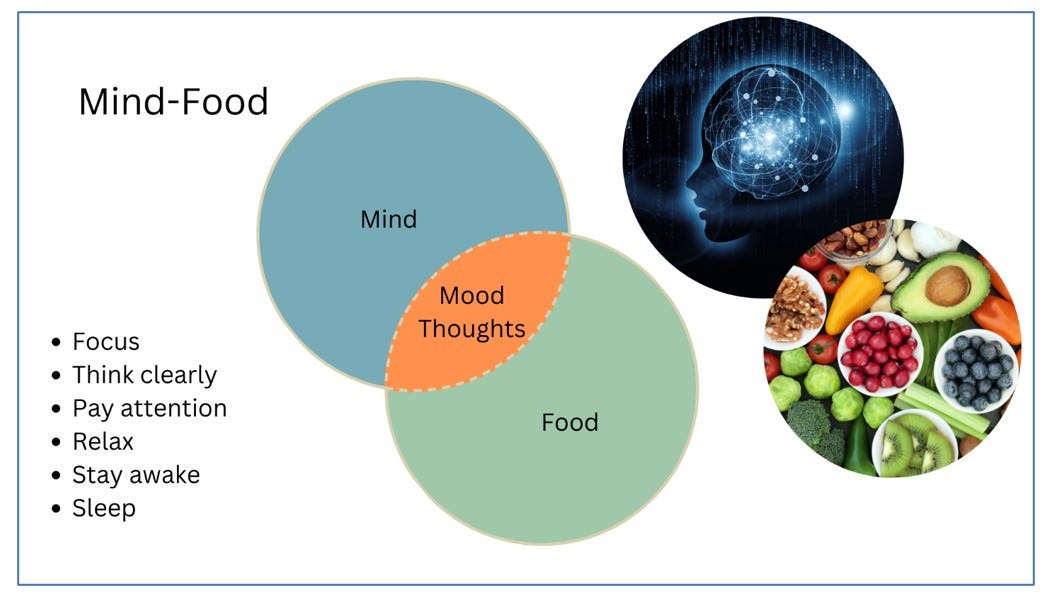
The Mind-Body-Food Connection
Some of the greatest health struggles in Western society originate from our reductionist science. In breaking everything down into its smallest components, and studying those independently, we have learned a LOT about minds and bodies. But in the real world, we are not any of those component parts, we are whole beings. We have so many moving parts in our lives that pinning our way forward on one thing – be it a medicine, a diet, an exercise routine, or lifestyle – makes little sense in the long run.
We need to step back and start bringing together these snippets of facts. Western medicine is fast to discourage and disparage the role of vitamins, minerals, and nutrients in our health and wellbeing, stating that deficiency diseases are rare in Western societies. However, there is a huge difference between consuming enough of a nutrient to not be deficient, and consuming enough to be well and fully functioning.
It is important to recognize that our for-profit food system and our for-profit medical system have no interesting in generating wellness. The former wants to grow food as cheaply as possible and sell it for the highest price available. That usually means taking healthy whole foods and processing them into convenience packages and formulations that are detrimental to our long-term health. We trade health for convenience and pay with sickness and shortened lives. The latter system wants nothing more than to sell you services and drugs to counteract all the convenience foods and poor dietary choices that you make. Healthy people need neither system often. Therefore, there is no capitalist argument to be made for creating healthy people, when sick people generate more profit for food and medical companies. Think about that the next time you go grocery shopping or pop a pill.
So the importance of understanding your Mind-Body-Food Connection is critical to your long term health and wellness. The pressures on our food and medical systems will only continue to escalate under this self-created spiraling model of modern food convenience and illness. The holy grail of health and wellness falls at the center of the complex interactions between your mind, your body and the food you choose to eat. You have a choice to make moving forward.
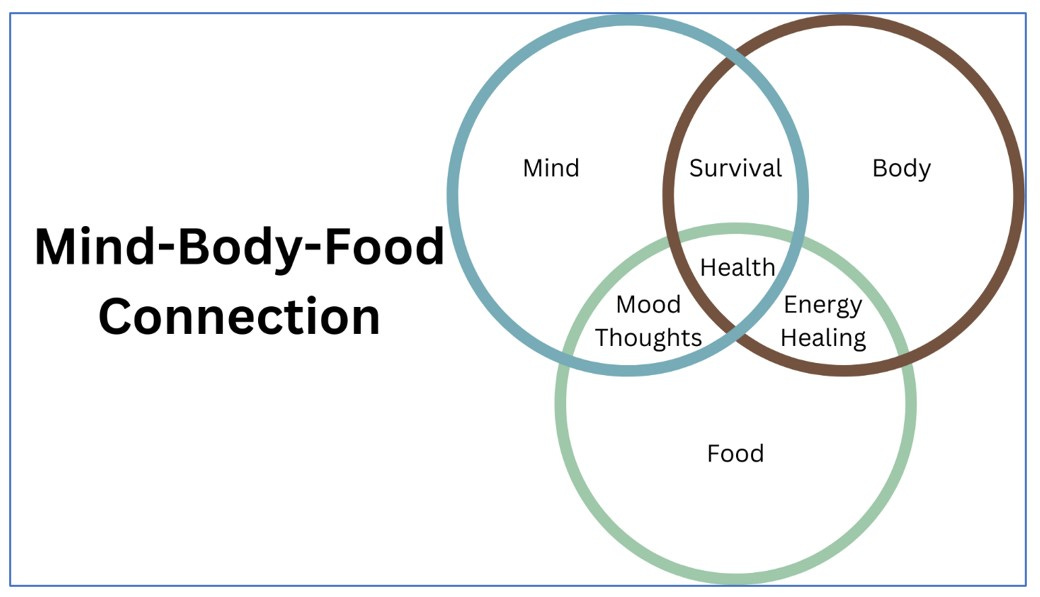
What comes next?
Over the next few months I will be diving in deeper on the Mind-Body-Food Connection here at The Naturalized Human. While I will post some of the information for free each month, I will reserve the deeper dives and science for paid subscribers who are helping to support my time, energy and focus hereon Substack.
For those joining me as paid subscribers, I will be offering strategies and action ideas for how best to apply the knowledge that I am bringing together in your own life. I am particularly focused on helping you identify and understand how Big-business is using this very same research and knowledge to better manipulate you into handing over your money, whether that is in your best interest or not.
Join me here each week. Things are just getting started at The Naturalized Human, so please bear with me as I create the systems I need to keep the information flow running smoothly. I will be posting new content most Mondays.
I look forward to getting to know you through your comments and questions so that I can fine tune my approach and delivery of posts to serve you, my readers, better.
Let’s Be Clear
I want to take a moment to be clear that this isn’t a diet or exercise plan. I am not going to tell you what you should and should not eat, or how many steps you need to take each week. What I will do is bring together the latest research and help you determine if this can benefit you or not.
If you know someone who would enjoy this post, please share it and/or encourage your friend to join The Naturalized Human too. I appreciate your help in spreading the word so that I can reach as many people as possible with this work.
If you know someone who would enjoy this newsletter, please feel free to share it using the link below.




